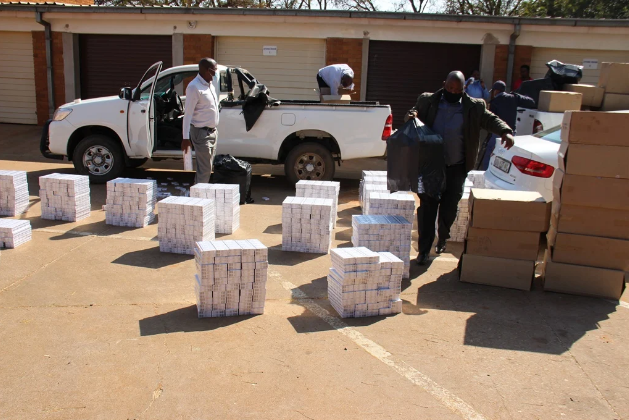'We are tired of talking. We want to see action: criminals in orange suits, the law being implemented and things must happen faster,' says founder of Tax Justice SA, Yusuf Abramjee.

Members of the Hawks seize illegal cigarettes. Image: SAPS.
The banning of alcohol and tobacco during lockdown has opened the door for the illicit trade of goods, but when people could buy booze and cigarettes again, not all of them returned to the legal market, but kept buying on the black market, costing the country billions in lost revenue.
The main obstacle to addressing the illicit trade in South Africa was the fact that the state was not capable of stopping it because state capture had weakened the justice system to such an extent that illicit trade could grow faster, said Busi Mavuso, chief executive officer (CEO) of Business Leadership South Africa (BLSA).
She was speaking at a webinar on illicit trade in South Africa held by BLSA and its subdivision, Business Against Crime South Africa (BACSA) to discuss resolutions and measures that could be adopted to mitigate the impact of illicit trade on South Africa’s economic stability.
Mavuso pointed out that the South African Revenue Service (Sars) was trying to “recapacitate” (sic) its illicit trade unit, but that it would unfortunately take a long time and lots of work to fix what was dismantled during state capture.
“The calibre of leadership in government is also not always at the required level,” she said.
Illegal trade out of control
Anti-crime activist and founder of Tax Justice SA, Yusuf Abramjee, said the illegal trade was out of control and that the banning of cigarettes and alcohol during the lockdown had opened the door for illegal activities even further.
ALSO READ: Beer association says new booze ban will cost jobs, increase illicit trade
“Two weeks ago we released our report about the illegal cigarette trade. Out of 40 stores we visited during our survey, 39 were selling a packet of cigarettes for less than R20,01. This means that no tax is paid, while the tax could have paid for vaccines. It is daylight robbery. We are losing R8 billion per year. Why is Sars not acting? Why are the police not acting?”
Abramjee said it was concerning that in some countries illicit traders were now making fake vaccines.
“We are tired of talking. We want to see action: criminals in orange suits, the law being implemented and things must happen faster.”
He suggested a minimum price on cigarettes, educating people about the illicit trade and dealing with corrupt officials to fight back against the illicit trade.
When legal trade is shut down
Kurt Moore, CEO of the South African Liquor Brand Owners Association, agreed that everyone had to move beyond talk shops.
“Our industry is one of the hardest hit by the ban and remember that when you shut down legal trade, there is more chance for the illicit trade to get in. R6,5 billion in tax revenue was lost in the alcohol sector that could have been used for vaccines now.”
ALSO READ: Continued booze ban could see illegal markets plague SA’s post-Covid economy, says study
He believes there are two main problems in the illicit alcohol trade: counterfeit products and diversion, where the products are imported by other countries through South Africa, but these never leave our borders.
“Counterfeit liquor is the most dangerous because we do not know what it contains and it is not regulated. A few weeks ago one of our members had a break-in where only bottle caps were stolen and I am sure it will be used for counterfeit products to make it look more like the real thing.”
Moore does not believe that minimum prices will help, because the illicit traders simply put their prices up. He also thinks the police spend too much time on the legal alcohol trade and not enough on catching the illicit traders.
Illicit economy competing with licit economy
Abraham Nelson, executive head of the Consumer Goods Crime Risk Initiative, warned that the illicit economy was growing at a rate where it competed with the licit economy.
“The biggest challenge is enforcement. Punitive measures are not a deterrent because someone who is picked up for selling illicit products will be back on the street soon selling the same thing.”
ALSO READ: British American Tobacco SA concerned about surge in cigarette robberies
He also pointed the finger at corrupt officials who facilitated the illicit trade, as well as a lack of collaboration in law enforcement and a lack of involvement by businesses and communities.
“Consignments of goods are often hijacked and the goods sold to informal traders to sell.”
Nelson said that the Consumer Goods Council’s hotline received a lot of calls initially, but they saw a drop in calls when the alcohol ban was instituted.
“The worrying fact is that the calls did not increase again after the ban was lifted because people were now involved. Crime is led by a demand for cheaper products.”
Law enforcement
Zacharia Motsumi, executive director of Tobacco Producers Development and director and spokesperson of the South African Tobacco Transformation Alliance, also pointed out how important it was for law enforcement to work. He would like to see Sars officials in every factory where cigarettes were made to check that tax was paid.
Consumers and retailers also needed to be educated to understand what the illicit trade was and how to recognise these products. Nelson said his organisation was planning a project this year to educate people at all levels. He also called on everybody to report illicit trading and that all stakeholders work together.
ALSO READ: Tax Justice SA outlines 5-point plan to stub out illicit cigarette trade
For more news your way, download The Citizen’s app for iOS and Android.





